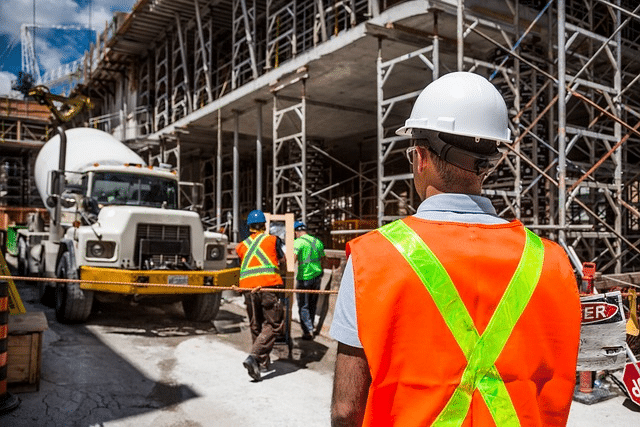What Exactly Is a Temporary Works Engineer and What Do They Do?

This post was originally published on this site

The construction industry contributes over £100 billion per year to the UK economy and it accounts for around 6.6% of all jobs. These roles are varied, from inspectors to project engineers, plumbers, electricians, crane operators and many more.
All major construction sites need temporary works solutions and the person who oversees the organisation and implementation of such works is vital to the success of the project. A temporary works engineer may not be as well known compared to roles like a plumber or scaffolder, but they have a highly important role to play. Many aspects of a construction project could not take place without the input of a temporary works engineer, so if you want to know more about what they do, why they’re important and the skills and experience that this line of work requires, read on to find out more.
What are temporary works?
Temporary works are the parts of a construction project that need to be put in place before the permanent works can be built. Temporary works are either taken down at the end of the project, or in some cases they can be incorporated into the permanent structure. Examples of temporary work include:
● Scaffolding
● Propping
● Facade retention
● Temporary bridges
● Site fencing
● Trenches
● Excavations
● Temporary slopes
● Stockpiles
What is a temporary works engineer?
A temporary works engineer is responsible for overseeing the management (and in some cases design), of any temporary works on a construction site. Their main roles include scheme advice or management, on-site compliance checking, preparation of design briefs, regular site visits and supervision, and providing support, assistance and training to employees as required. We will discuss some of the duties and aspects of this role in more detail, further on.
In some cases, a temporary works engineer may be referred to as a temporary works coordinator, but coordinating the temporary works is not automatically the responsibility of the engineer providing the design work. However, in many cases the design and coordination of the temporary works will be carried out by the same employee, for ease.
There is no legal requirement to appoint somebody with this job title, but whoever is in control must ensure that work is allocated and carried out in a manner that does not create unacceptable risk of harm to workers or members of the public. This can be managed by completing a temporary works register, independent checks of any designs and frequent checks of any temporary works both while they are erected and upon dismantle.
Skills and experience
Many temporary works engineers will hold a degree in civil or structural engineering and it’s advantageous to have experience within a consultancy or contractor environment. There are additional higher education qualifications that people can take if they wish to become a temporary works engineer, such as the MSc in Temporary Works and Construction Method Engineering. This type of course usually requires an upper second class honours degree in Civil Engineering or a relevant subject, but alternative qualifications combined with relevant experience may also be considered.
Useful skills and experience required include being proficient in the design of temporary works (such as formwork and falsework), experience working on site (including residential, commercial and industrial projects), the ability to understand site operations and constraints and the importance of erection methods and coordination.
Temporary works engineers should also have excellent communication skills and the ability to work closely with contractors and other workers.
What do they do?
The role of a temporary works engineer can cover many different areas, including design, management, health and safety, site checks and demolition. Some engineers may wish to focus on their skills as a practical engineer working onsite, whereas others may want to specialise in the design of temporary works structures. A temporary works engineer is an important role, as poorly planned, designed or constructed temporary works can pose considerable risk to both employees and surrounding structures.
We will discuss some of the most common tasks carried out by a temporary works engineer in more detail below.
Slope and excavation stability
This involves carrying out stability assessments for rock and soil cuts, as well as investigating temporary excavation sites. Slope stability refers to the ability of soil covered slopes to undergo and withstand movement. It’s vital to ensure the stability of a slope or excavation site before any permanent works go ahead, for the safety of the construction site and to ensure that the structure doesn’t move during construction, or in the future.
Scaffolding design
Scaffolding is a temporary structure used to support workers and equipment during the construction, renovation or clean of a building. It is a requirement of the Work at Height Regulations 2005 that unless a scaffold is assembled to a generally recognised standard configuration, then it should be of bespoke design by a competent person, to ensure it will have adequate strength, rigidity and stability while it is erected.
Many temporary works engineers work with contractors to design scaffolding solutions that are bespoke to each project, including truss-out scaffolding, temporary roofs, suspended access platforms and bridging scaffolds.
Shoring
Shoring is the process of temporarily supporting a building, vessel, structure, or trench with shores (props) when in danger of collapse or during repairs or alterations. Shoring can take several forms, including diaphragm walls, cofferdams, raking walls and flying shoring and it helps to enhance the safety of a foundation during the excavation process.
Foundations and piling
Temporary works engineers can also put together designs for the foundations or piles of a construction project. Temporary pile solutions are often designed for ease of removal and they can be reused again and again if required. Temporary groundwork solutions include a wide range of equipment, such as steel road plates, lightweight trench box systems, pipe stoppers, concrete skips, piles and more.
Surface and groundwater control
This includes carrying out seepage and dewatering assessments, to ensure that structures will be stable and not undermined. It might also involve tests to evaluate ground permeability and installation of piezometers (a device used to measure liquid pressure in a system), to take accurate measurements of groundwater condition. This is essential to ensure that workers can carry out engineering excavations below groundwater level in workably dry, stable and safe conditions.
Site inspections
These are vital for the health and safety of all employees, and will include a checklist to complete. This could cover several aspects, including thorough investigation of ground conditions, assessment of the scaffold design, inspection of the quality of installations and ensuring all procedures and materials comply with regulations and field testing.
It’s also useful to prepare a temporary works register for any project. This should contain a list of all identified temporary works items associated with the project, such as a description of all temporary works, the date required, dates of checks/approval and design brief numbers.
Demolition/alteration of structures
In some cases, temporary works engineers will be required to manage and oversee the demolition or alteration of building structures, including the removal and safe disposal of any construction waste. This can be managed by arranging for temporary solutions to be put in place, such as:
● Skip hire for construction waste
● Scaffolding to protect the buildings being demolished and surrounding structures
● Back propping systems to maintain stability during demolition
● Weatherproofing for nearby structures exposed from the demolition
● Earthworks support
● Facade retention schemes
Imperium Engineering – Expert Temporary Work Design in London, Kent and Essex
If you’re looking for professional scaffolding contractors in London and beyond, get in touch with the team at Imperium Engineering. We’re proud to offer a variety of construction services, including temporary works design, scaffolding, access platforms, temporary roofing, and bespoke designs based on your needs.





Responses